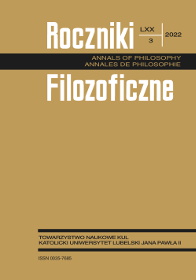Arystoteles i początki pojęcia powszechnika
Aristotle and the Beginnings of the Concept of the Universal
Author(s): Tomasz TiurynSubject(s): Philosophy, Philosophical Traditions, Ontology
Published by: Towarzystwo Naukowe KUL & Katolicki Uniwersytet Lubelski Jana Pawła II
Keywords: Aristotle; problem of universals; realism; abstract objects
Summary/Abstract: The aim of this paper is to discuss Aristotle’s concept of the universal, and in particular to defend the claim that Aristotle’s concept is different from the modern concept of the universal, which is understood as the entity common to many individuals. For Aristotle, the universal is first and foremost an object which is predicated, is the object of the acts of the intellect, and is the object of the definition. In the text I also show that universals in Aristotle’s theory are causally inert, so they cannot be properties or causes of properties of individuals. This makes them similar to the modern concept of abstract objects such as Frege’s senses. The immediate point of reference for this paper is Paweł Rojek’s book Tropy i uniwersalia. Badania ontologiczne [Tropes and Universals: Ontological Investigations] (2019). I argue here against Rojek’s reading of the classical concept of the universal, and above all, against his interpretation of the theory of Thomas Aquinas.
Journal: Roczniki Filozoficzne
- Issue Year: 70/2022
- Issue No: 3
- Page Range: 297-324
- Page Count: 28
- Language: Polish

